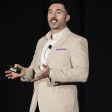Employee Engagement Speakers
Your team's feeling disconnected. Morale is dipping, and the last all-hands meeting? Not exactly inspiring.
You know you need someone who can actually speak to the real challenges of engagement today... but how do you find the right employee engagement speakers?
There are a lot of voices out there. Some talk in buzzwords. Some go deep on strategy. The best employee engagement speakers? They do both.
They get what teams are going through, and they know how to keep an audience leaning in.
Whether you're planning a company offsite, a podcast on workplace culture, or a panel on team performance, you want someone who's real, sharp, and has something worthwhile to say.
I've seen how the right speaker can shift the energy in a room and leave people thinking differently about work. That's what you want.
Here, you'll find a curated group of employee engagement speakers who know their stuff and know how to deliver. Take a look, get inspired, and book someone who fits your goals.
Top Employee Engagement Speakers List for 2026
Joan Johnston
Building empathetic teams for exceptional customer experiences.
John Racine
Transforming HR into a powerhouse of people and performance
Jonathan Villaire
Treating employees like human beings, not human capital.
Taresa Scott
The Learning Strategist turning employee development into a high-impact retention engine
Diane Prince
Startup expert with experience launching, growing, and monetizing businesses up to $50 million.
Cheryl Powell
Cheryl Powell of Learn2Engage blends 28 years of instructional expertise with a storyteller’s flair, creating unforgettable programs
John Couper
Transforming challenge into opportunity through INpowering communication.
Consuela Muñoz
Driving employee engagement through leader engagement—turning leaders into crew captains, teams into crews, and goals into heists worth plan
Alice Van Blokland
Empowering joy, unleashing potential—let's transform together!
Brian Fippinger
Speaker, Best Selling Author, and former Improv Actor who had been coaching leaders for 46 years.
What Makes a Great Employee Engagement Speaker
A great employee engagement speaker doesn't just talk about motivation or culture in abstract terms. They connect the dots between real-world business challenges and human behavior. Think of someone like Simon Sinek, who doesn't just say 'start with why'-he shows you how to find it in your team. Or Priya Parker, who reframes how we gather and collaborate. These speakers don't just inform, they transform how people think about their roles.
What sets them apart is their ability to read the room-even virtually. They adapt their tone, pace, and message to suit the energy of the audience. Whether it's a startup team in Berlin or a Fortune 500 HR summit in Chicago, they know how to make it feel personal. They use stories, data, and humor in just the right mix.
And here's the kicker: they don't just speak. They listen. The best employee engagement speakers build their talks around the actual needs of the organization. They ask questions beforehand, tailor their message, and follow up with actionable insights. That's what makes them memorable-and effective.
So if you're looking for someone who can truly move the needle on engagement, don't settle for a generic keynote. Look for someone who brings energy, empathy, and evidence to the stage.
How to Select the Best Employee Engagement Speaker for Your Show
1. Define Your Objectives.
- What's the purpose of the session? Are you trying to boost morale, address burnout, or inspire leadership?
- Be clear on the outcome you want-this will shape your speaker shortlist.
2. Know Your Audience.
- Are you speaking to frontline workers, remote teams, or senior managers?
- Different audiences resonate with different styles. A high-energy speaker might work for a sales team, while a more reflective tone suits HR professionals.
3. Research and Shortlist.
- Use platforms like Talks.co to browse speaker profiles, watch past talks, and read reviews.
- Look for speakers who've worked with similar industries or company sizes.
4. Review Content Fit.
- Check if their core message aligns with your theme. For example, if your event focuses on hybrid work, make sure the speaker has relevant insights.
- Watch at least one full-length talk to assess delivery style and depth.
5. Connect and Customize.
- Reach out via their speaker page or through a platform like Talks.co.
- Ask if they tailor their content to specific audiences. The best ones always do.
6. Confirm Logistics.
- Make sure they're available for your date, understand your tech setup (especially for virtual events), and are open to pre-event calls.
Following these steps ensures you're not just booking a speaker-you're creating a meaningful experience for your audience.
How to Book an Employee Engagement Speaker
1. Start with a Clear Brief.
- Define your event goals, audience profile, preferred format (keynote, panel, workshop), and budget.
- Include your event date, location (or virtual platform), and expected outcomes.
2. Browse and Shortlist.
- Use speaker directories like Talks.co to explore profiles, watch videos, and read testimonials.
- Filter by topic, industry experience, and availability.
3. Reach Out.
- Contact the speaker directly through their Talks.co profile or website.
- Share your event brief and ask about availability, customization options, and fees.
4. Set Up a Discovery Call.
- Use this call to gauge chemistry, clarify expectations, and discuss how they'll tailor their content.
- Ask about audience engagement strategies, especially for virtual sessions.
5. Finalize the Agreement.
- Once you're aligned, request a formal proposal or contract.
- Confirm deliverables: keynote length, Q&A, pre-event calls, post-event materials, etc.
6. Promote and Prepare.
- Add the speaker to your event marketing. Use their bio, headshot, and talk title.
- Schedule a tech check or rehearsal if needed.
7. Follow Up Post-Event.
- Collect feedback from attendees and share it with the speaker.
- If it went well, consider a future collaboration or referral.
Booking a speaker is more than a transaction-it's a partnership. When done right, it elevates your entire event.
Common Questions on Employee Engagement Speakers
What is an employee engagement speaker
Unlike general motivational speakers, employee engagement speakers focus specifically on the dynamics of workplace culture. They address topics like communication, leadership, recognition, well-being, and purpose. Their goal is to help organizations create environments where employees feel valued, heard, and driven to contribute.
These speakers often come from diverse backgrounds-some are former HR executives, others are behavioral psychologists, and many are business leaders who've led high-performing teams. What unites them is their ability to translate theory into practice. For example, a speaker might explain how Google uses psychological safety to boost team performance, then show how a 20-person startup can apply the same principle.
Their talks are typically grounded in research, case studies, and real-world examples. They may reference Gallup's engagement data, share stories from companies like Zappos or Atlassian, or highlight trends in remote work and DEI (diversity, equity, and inclusion).
In short, an employee engagement speaker helps organizations understand what drives people to show up, speak up, and stay engaged at work-and how to make that happen consistently.
Why is an employee engagement speaker important
First, they bring an outside perspective. Internal teams often get stuck in their own narratives. A skilled speaker can challenge assumptions, introduce fresh ideas, and reframe old problems in new ways. For example, a speaker might show how a manufacturing firm in Ohio boosted retention by rethinking shift schedules-something your team hadn't even considered.
Second, they translate data into action. You've probably seen the stats: disengaged employees cost companies billions in lost productivity. But what do you actually do about it? An experienced speaker breaks down the numbers and shows practical steps to improve engagement, whether through better feedback loops, recognition programs, or leadership training.
Third, they energize your people. Especially during times of change-like mergers, layoffs, or remote transitions-a great speaker can reignite purpose and connection. They don't just talk at your team; they speak with them, creating moments of clarity and motivation.
Finally, they help you build a culture of continuous improvement. Engagement isn't a one-time fix. It's a mindset. By bringing in a speaker regularly-say, once a quarter-you reinforce that message and keep momentum going.
So if you're serious about improving how your team feels and performs at work, investing in an employee engagement speaker is more than smart-it's strategic.
What do employee engagement speakers do
They design and deliver presentations that focus on how to create more connected, motivated, and productive workplaces. This might include topics like building trust, fostering inclusion, improving communication, or aligning personal values with company goals. For example, a speaker might walk a tech team through how Atlassian uses team charters to improve collaboration, then guide them in creating their own.
Beyond the stage, many employee engagement speakers offer workshops, breakout sessions, or consulting. They may facilitate interactive sessions where teams identify engagement blockers or co-create solutions. Some even work with leadership teams to align engagement strategies with business objectives.
They also tailor their content to different industries and cultures. What works for a healthcare team in Toronto might not resonate with a retail group in Mumbai. Great speakers adjust their language, examples, and delivery style accordingly.
In essence, employee engagement speakers help organizations understand the human side of performance-and give them the tools to improve it. Whether it's through a keynote at a global summit or a Zoom session with a 10-person team, their job is to spark insight, dialogue, and action.
How to become an employee engagement speaker
1. Define Your Niche and Message.
- Start by identifying what unique perspective or experience you bring to the table. Are you focused on remote team engagement? Diversity and inclusion? Cross-cultural team dynamics? The more specific, the better.
- Tip: Look at trending topics on LinkedIn or Talks.co to see what companies are booking speakers for.
2. Build Your Credibility.
- You don't need a PhD, but you do need proof. Case studies, leadership roles, or results from your own team can all work.
- Publish articles, record short videos, or host webinars to showcase your insights.
3. Create a Speaker Page.
- Use platforms like Talks.co to set up a professional speaker profile. Include your bio, topics you speak on, testimonials, and a short demo video.
- Make it easy for event organizers to find and book you.
4. Network with Hosts and Event Planners.
- Join speaker directories, attend virtual summits, and connect with podcast hosts. Talks.co is great for matching speakers with event hosts.
- Tip: Offer to speak for free at first to build your portfolio.
5. Practice and Polish Your Delivery.
- Join a local Toastmasters group or rehearse with peers. Record yourself and review your tone, pacing, and clarity.
- Consider hiring a speaking coach if you're serious about scaling.
6. Start Small, Then Scale.
- Begin with webinars, team trainings, or local business events. As you gain traction, aim for conferences, corporate retreats, and global summits.
Remember, every great speaker started somewhere. The key is to start, iterate, and keep showing up.
What do you need to be an employee engagement speaker
Expertise in Employee Engagement:
You must understand what drives employee engagement in different contexts. This includes knowledge of leadership styles, organizational culture, communication strategies, and performance metrics. Whether you've led a team through a major transformation or implemented a successful engagement program, your experience is your foundation.
Strong Communication Skills:
Being an effective speaker means being able to connect with diverse audiences. You need to translate complex ideas into relatable messages. This includes storytelling, active listening, and adapting your tone depending on whether you're speaking to HR leaders, executives, or frontline employees.
A Personal Brand:
Your brand sets you apart. It's how people remember you. Build a consistent online presence through LinkedIn, a personal website, or a Talks.co speaker page. Share insights, post videos, and engage with your audience regularly. Your brand should reflect your values, voice, and vision.
Professional Materials:
Event organizers want to see a polished speaker. This includes:
- A professional headshot.
- A clear speaker bio.
- A list of topics you cover.
- Testimonials or references.
- A demo reel or video clips of past talks.
A Platform to Get Booked:
You need to be discoverable. Platforms like Talks.co help connect speakers with event hosts. Having a profile there increases your visibility and credibility.
In short, to be an employee engagement speaker, you need a mix of subject matter expertise, communication chops, a strong personal brand, and the right tools to get booked. It's not just about speaking-it's about being seen as the go-to expert in your niche.
Do employee engagement speakers get paid
Payment Models:
- Flat Fee: Most common for keynote speeches or workshops. Fees can range from $1,000 to $25,000+ depending on experience and demand.
- Per Engagement: Some speakers are paid per event, especially for webinars or panel discussions.
- Retainers: Larger organizations may hire speakers on a retainer basis for ongoing training or consulting.
- Revenue Share: In virtual summits or ticketed events, some speakers earn a percentage of ticket sales.
Factors That Influence Pay:
- Experience: New speakers might earn $500 to $2,500 per talk. Seasoned professionals can command $10,000 or more.
- Audience Size: Speaking at a Fortune 500 event pays more than a local chamber of commerce.
- Format: In-person keynotes typically pay more than virtual sessions.
- Region: Speakers in North America and Western Europe often earn more due to higher event budgets.
Pros:
- High earning potential.
- Opportunities for repeat business.
- Can lead to consulting gigs or book deals.
Cons:
- Inconsistent income, especially early on.
- Travel and prep time can be extensive.
- Requires ongoing marketing and networking.
In short, yes-employee engagement speakers get paid. But like any business, it takes time to build a reputation that commands premium fees.
How do employee engagement speakers make money
1. Keynote Speaking Engagements:
- This is the most direct source of income. Speakers are hired by companies, conferences, or HR summits to deliver talks on boosting employee morale, improving workplace culture, or increasing retention.
- Rates vary widely, from $1,000 for small events to $25,000+ for high-profile conferences.
2. Workshops and Training Sessions:
- Many speakers offer half-day or full-day workshops. These are more interactive and tailored to a company's specific needs.
- These sessions often pay more than a single keynote and can lead to long-term consulting contracts.
3. Online Courses and Webinars:
- Speakers often package their expertise into digital products. Platforms like Teachable or Thinkific are popular for this.
- Webinars can also be monetized through ticket sales or sponsorships.
4. Books and Publications:
- Publishing a book on employee engagement can establish authority and generate passive income.
- Books also serve as a marketing tool to land speaking gigs.
5. Consulting and Coaching:
- Many speakers transition into consulting roles with companies looking for long-term engagement strategies.
- Executive coaching is another lucrative path, especially for speakers with a leadership background.
6. Affiliate and Partner Programs:
- Some speakers earn commissions by promoting tools or platforms they use in their talks, like engagement software or HR tech.
7. Speaking Platforms:
- Platforms like Talks.co help speakers get discovered and booked, often with built-in monetization options.
By combining these income streams, employee engagement speakers can build a sustainable and scalable business model.
How much do employee engagement speakers make
Average Earnings:
- Beginner Speakers: $500 to $2,500 per talk. These are often local events, webinars, or internal company sessions.
- Mid-Level Speakers: $3,000 to $10,000 per engagement. These speakers have a solid portfolio and are often booked for industry conferences.
- Top-Tier Speakers: $15,000 to $50,000+ per keynote. These are recognized experts, authors, or former executives with a global reputation.
Annual Income Ranges:
Depending on how often they speak and what other services they offer (like consulting or online courses), here's a rough breakdown:
| Speaker Level | Talks/Year | Income Range |
|---|---|---|
| Beginner | 10-20 | $10,000 - $50,000 |
| Mid-Level | 20-40 | $60,000 - $250,000 |
| Top-Tier | 40+ | $300,000+ |
- Geography: Speakers in the US, UK, and Australia often command higher fees.
- Industry: Tech and finance events usually have bigger budgets than nonprofits or education.
- Format: In-person keynotes typically pay more than virtual sessions.
- Reputation: A bestselling book or TEDx talk can significantly boost your rates.
So while the range is broad, the ceiling is high. With the right positioning and consistent marketing-especially through platforms like Talks.co-employee engagement speakers can build a six- or even seven-figure business.
How much do employee engagement speakers cost
Typical Cost Ranges:
- Local or Emerging Speakers: $500 to $2,000. Ideal for small businesses or local HR events.
- Mid-Level Professionals: $3,000 to $10,000. These speakers have a proven track record and solid testimonials.
- High-Profile Experts: $15,000 to $50,000+. These are often bestselling authors, former executives, or global thought leaders.
Factors That Influence Cost:
- Event Type: A 30-minute virtual keynote will cost less than a full-day in-person workshop.
- Customization: Tailored content, pre-event consultations, and post-event follow-ups can increase the fee.
- Travel and Logistics: For in-person events, you'll also need to cover travel, lodging, and per diem expenses.
- Audience Size: Larger audiences often mean higher fees, especially for conferences or summits.
Cost Comparison Table:
| Speaker Level | Virtual Talk | In-Person Keynote | Full-Day Workshop |
|---|---|---|---|
| Emerging | $500 | $1,500 | $2,500 |
| Mid-Level | $3,000 | $7,500 | $10,000 |
| High-Profile | $10,000+ | $25,000+ | $40,000+ |
- Use platforms like Talks.co to compare speaker profiles and pricing.
- Ask about package deals if you want multiple sessions or ongoing support.
- Consider virtual options to save on travel and venue costs.
In short, the cost of hiring an employee engagement speaker depends on your goals, audience, and budget-but there's a speaker out there for every price point.
Who are the best employee engagement speakers ever
- Simon Sinek: Known for his concept of 'Start With Why', Sinek has influenced how leaders think about purpose and engagement.
- Patrick Lencioni: Author of 'The Five Dysfunctions of a Team', Lencioni's insights into team dynamics have made him a go-to speaker for corporate leadership.
- Brene Brown: Her work on vulnerability and trust has transformed how companies approach emotional intelligence and employee connection.
- Daniel Pink: With books like 'Drive', Pink explores what truly motivates employees-autonomy, mastery, and purpose.
- Tony Robbins: While not solely focused on employee engagement, Robbins has inspired millions with his high-energy talks on performance and mindset.
- Shawn Achor: A Harvard researcher and author of 'The Happiness Advantage', Achor links positive psychology with workplace productivity.
- Marshall Goldsmith: One of the top executive coaches globally, Goldsmith's work on leadership behavior directly impacts engagement.
- Liz Wiseman: Her book 'Multipliers' explores how leaders can amplify the intelligence and engagement of their teams.
- Adam Grant: An organizational psychologist and bestselling author, Grant's research on motivation and meaning is widely cited in HR circles.
- Kim Scott: Author of 'Radical Candor', Scott's approach to honest communication has reshaped how managers engage with their teams.
These speakers have not only delivered powerful talks but also influenced how organizations think about culture, leadership, and engagement.
Who are the best employee engagement speakers in the world
- Priya Parker (USA): Author of 'The Art of Gathering', Parker focuses on how intentional meetings and rituals can boost team cohesion.
- Bruce Daisley (UK): Former VP at Twitter Europe, Daisley speaks on workplace culture and is the author of 'The Joy of Work'.
- Hamza Khan (Canada): A multi-award-winning entrepreneur and author, Khan speaks on burnout, engagement, and generational leadership.
- Leena Nair (India/UK): Former CHRO at Unilever and now CEO at Chanel, Nair speaks on human-centric leadership and global workforce engagement.
- Tiffani Bova (USA): As Global Growth Evangelist at Salesforce, Bova connects employee experience with customer experience in her talks.
- Dr. Tanvi Gautam (Singapore): A leadership development expert, Gautam is known for her work on inclusive engagement and digital transformation.
- Nigel Marsh (Australia): Author of 'Fat, Forty and Fired', Marsh blends humor and insight to speak on work-life balance and employee fulfillment.
- Rasmus Hougaard (Denmark): Founder of Potential Project, Hougaard speaks on mindfulness, compassion, and leadership in the workplace.
- Debra Corey (UK): A global HR thought leader, Corey is known for her practical, engaging talks on recognition, reward, and culture.
- Gustavo Razzetti (USA/Argentina): Founder of Fearless Culture, Razzetti helps teams build psychologically safe environments that drive engagement.
These speakers bring fresh, global perspectives to the employee engagement conversation-whether through research, storytelling, or lived experience.
Common myths about employee engagement speakers
1. Myth: Employee engagement speakers are just motivational cheerleaders.
This one comes up a lot. People assume these speakers are all hype and no substance. But here's the truth: the best employee engagement speakers are strategic communicators. They blend behavioral science, organizational psychology, and real-world business insights to drive measurable change. For example, speakers like Simon Sinek don't just pump people up-they shift mindsets around purpose and leadership, which directly impacts engagement.
2. Myth: You need to be a corporate executive to become an employee engagement speaker.
Not true. While some speakers come from executive backgrounds, many successful ones started as educators, coaches, or even frontline workers. What matters more is your ability to connect, communicate, and offer actionable insights. Take Priya Parker, for instance. Her background in conflict resolution and group dynamics makes her a sought-after voice on engagement, even without a traditional corporate resume.
3. Myth: Employee engagement is only relevant for large companies.
This idea limits the conversation. Engagement is just as critical in small businesses, startups, and even nonprofits. In fact, smaller organizations often have more flexibility to implement speaker-led initiatives. A speaker who understands the nuances of a 10-person team can be just as impactful as one addressing a Fortune 500 audience.
4. Myth: One keynote can fix disengagement.
A single talk can spark change, but sustained engagement requires follow-through. The most effective speakers work with organizations to integrate their message into ongoing training, leadership development, and culture-building. Think of the keynote as the ignition, not the engine.
5. Myth: Employee engagement speakers are interchangeable.
Nope. Each speaker brings a unique lens-some focus on DEI, others on remote work culture, others on leadership psychology. Choosing the right speaker means aligning their expertise with your organization's specific challenges. It's not about who's the most famous, but who's the best fit.
Case studies of successful employee engagement speakers
Take Jennifer McClure. She started out in HR leadership before becoming a speaker. One of her most impactful engagements was with a mid-sized manufacturing firm in the Midwest. Morale was low, turnover was high, and leadership was struggling to connect with frontline staff. Jennifer didn't just deliver a talk-she facilitated a series of interactive sessions that helped managers understand the emotional drivers of their teams. Within six months, employee satisfaction scores rose by 23%, and retention improved significantly.
Then there's Eric Termuende, who focuses on workplace culture and the future of work. He worked with a tech startup in Berlin that was scaling fast but losing its cultural identity. Eric's sessions helped the founders reframe engagement not as perks and ping-pong tables, but as clarity, trust, and autonomy. They implemented his 'one-degree shifts' strategy-small, consistent changes that compound over time. The result? A more cohesive team and a 40% increase in internal referrals.
In Australia, Yamini Naidu blends storytelling with leadership development. She partnered with a government agency struggling with disengaged remote teams. Instead of a traditional keynote, she ran a virtual storytelling bootcamp for team leaders. They learned how to use personal narratives to connect with their teams authentically. Engagement scores jumped, and internal communication became more human and effective.
These stories highlight a key point: successful employee engagement speakers don't just talk-they listen, adapt, and co-create solutions. Whether it's a factory floor in Ohio, a startup hub in Europe, or a public sector team in Sydney, the best speakers meet people where they are and help them move forward together.
Future trends for employee engagement speakers
First, hybrid work isn't going anywhere. That means speakers need to tailor their content for both in-person and virtual audiences. But it's not just about format-it's about relevance. Engagement in a hybrid world looks different. Speakers who can address digital fatigue, asynchronous communication, and belonging in remote teams will be in high demand.
Second, data is becoming more central. Organizations want proof that a speaker's message leads to results. Expect more speakers to integrate metrics, pre- and post-event surveys, and even AI-driven feedback tools. Those who can show ROI-like improved retention or engagement scores-will stand out.
Third, diversity of voice is gaining momentum. Companies are no longer looking for one-size-fits-all messages. They want speakers who reflect their workforce-across race, gender, age, and background. This opens up space for new voices from underrepresented communities to step into the spotlight.
Here are a few trends to watch:
- Micro-engagements: Short, high-impact sessions embedded into team meetings or onboarding.
- Interactive formats: Think live polls, breakout rooms, and co-creation exercises.
- Industry-specific insights: Tailored content for sectors like healthcare, education, or logistics.
- Global fluency: Speakers who understand cultural nuances and can engage international teams.
The future isn't about louder voices-it's about smarter, more inclusive, and more actionable ones. If you're thinking about becoming an employee engagement speaker, now's the time to lean into these shifts and build your edge.
Tools and resources for aspiring employee engagement speakers
1. Talks.co. A smart platform that matches speakers with podcast hosts and event organizers. Great for building credibility and getting your voice out there, especially if you're just starting.
2. Slidebean. Need to build a killer deck without spending hours on design? Slidebean lets you focus on content while it handles the visuals. Perfect for crafting presentations that look pro.
3. SpeakerHub. A global directory where you can list your profile, browse speaking opportunities, and connect with event planners. It's especially useful for niche topics like employee engagement.
4. Notion. Organize your research, scripts, client notes, and feedback in one place. Use it to build a speaker dashboard that tracks your gigs, testimonials, and content ideas.
5. Otter.ai. Record and transcribe your talks or practice runs. Reviewing your own delivery is one of the fastest ways to improve your clarity and pacing.
6. LinkedIn Learning. Offers courses on public speaking, leadership, and employee engagement. If you're transitioning from another field, this is a solid way to build foundational knowledge.
7. Zoom Events. If you're planning to host your own virtual sessions or workshops, Zoom Events gives you tools to manage registration, networking, and analytics.
8. Canva. For social media graphics, speaker one-sheets, and branded content. It's drag-and-drop easy and helps you look polished across platforms.
Pro tip: Combine a few of these tools into a workflow. For example, use Otter.ai to transcribe your practice session, Notion to store the feedback, and Talks.co to pitch yourself to relevant podcasts. The more systemized your process, the more time you'll have to focus on your message.









